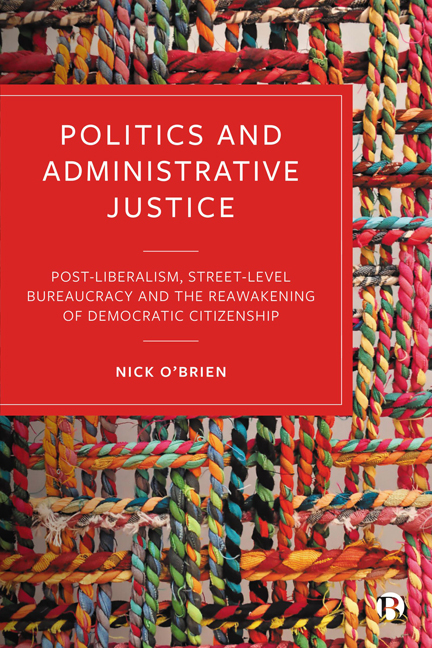 Politics and Administrative Justice
Politics and Administrative Justice Book contents
- Frontmatter
- Dedication
- Contents
- About the Author
- Acknowledgements
- 1 Introduction
- 2 Street-Level Bureaucracy and the Response to Citizen Grievance
- 3 The ‘Social Imaginary’ of Liberal Legalism
- 4 The Promise of Postliberalism
- 5 Citizen Grievance and the Spectre of Legalism
- 6 Postliberal Accountability: The Challenge of Disability Human Rights
- 7 Responding to Grievance: Mental Health and Special Educational Needs and Disability
- 8 Postliberal Administrative Justice
- 9 Conclusion
- References
- Index
5 - Citizen Grievance and the Spectre of Legalism
Published online by Cambridge University Press: 27 March 2024
- Frontmatter
- Dedication
- Contents
- About the Author
- Acknowledgements
- 1 Introduction
- 2 Street-Level Bureaucracy and the Response to Citizen Grievance
- 3 The ‘Social Imaginary’ of Liberal Legalism
- 4 The Promise of Postliberalism
- 5 Citizen Grievance and the Spectre of Legalism
- 6 Postliberal Accountability: The Challenge of Disability Human Rights
- 7 Responding to Grievance: Mental Health and Special Educational Needs and Disability
- 8 Postliberal Administrative Justice
- 9 Conclusion
- References
- Index
Summary
In the context of citizen grievance, the postliberal invocation of responsive legality is not without precedent in the literature of public administration, albeit expressed in rather different form. The interwar years in Britain were notably receptive to strains of political thought drawn from the traditions of philosophical Idealism, political pluralism, civic humanism and political pragmatism. In particular, those, such as William Robson and Laski, associated with the functionalist style of public law theory at the London School of Economics, drew on aspects of these traditions of thought in developing ideas about the relationship between citizen and state, and about the way in which the state should respond to citizen grievance. Despite the endurance of such approaches into the postwar period, their failure to take root, especially during the 1980s, became especially pronounced, as new forms of legalism and managerialism came to dominate an increasingly neoliberal discourse. In particular, the originally generous aspirations for administrative tribunals and public ombud institutions were attenuated, giving way to acquiescence in restricted forms of legality that defeated the more ambitious aspirations of earlier reformers. Responsive legality was not so much tried and found wanting, but rather not really tried.
Public administration and ‘the welfare of society’
In the field of public administration, the shockwaves felt in Britain by the renewed stirrings of the interventionist state during the First World War accentuated the ‘problem of bureaucracy’ and elicited the startled reactions of those who feared in the ‘new despotism’ the emergence of a constitutional crisis. Dicey’s advocacy of the rule of law and individual liberty represented a strong bulwark against the encroachments of collectivism and legislative innovation. Among those who undertook, from a very different perspective, to think through in some depth an alternative response was Robson, whose Justice and Administrative Law (Robson, 1928) remains a foundational text of the ‘functionalist’ style of public law theory (Loughlin, 1992, 2005). In his insistence on the importance of the common good, the general welfare and the rule of reason, Robson is representative of sustained attempts to find in such concepts a rival to the dominant strain of legalism in liberal thought, especially in its encounter with public administration in practice.
- Type
- Chapter
- Information
- Politics and Administrative JusticePostliberalism, Street-Level Bureaucracy and the Reawakening of Democratic Citizenship, pp. 54 - 69Publisher: Bristol University PressPrint publication year: 2023


